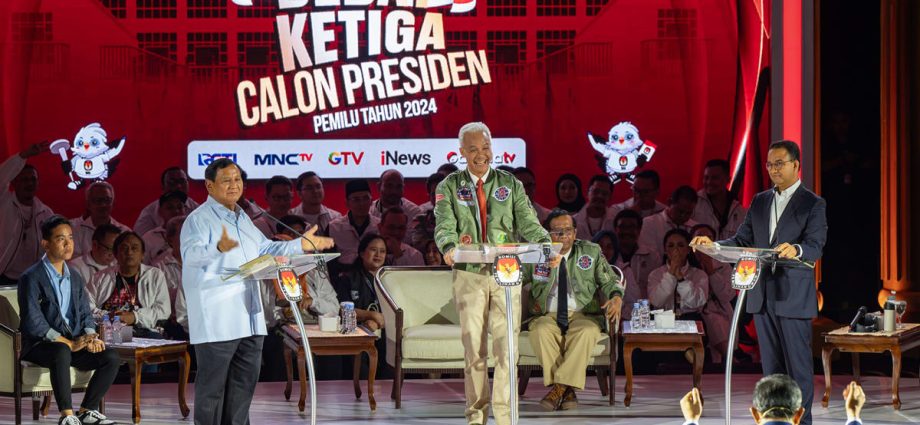
NOT THE FIRST ATTACK
During the first debate on Dec 12 which covered areas in law, human rights, eradication of corruption, governance, improving public service, strengthening democracy, tackling disinformation, and managing civic harmony, Mr Anies also focused his criticisms on Mr Prabowo while Mr Ganjar was more reserved.
The second debate was for the vice presidential candidates – Mr Muhaimin Iskandar, who is teaming up with Mr Anies; Mr Gibran Rakabuming Raka who is Mr Prabowo’s running mate; and Mr Mahfud MD who is the vice presidential candidate of Mr Ganjar.
The third debate was for the presidential candidates again, and Mr Anies and Mr Ganjar took aim at Mr Prabowo’s military procurement strategy as defence minister.
Mr Anies criticised Mr Prabowo, who is vying for the presidency for the third time in a row, for procuring billions of dollars for weaponry, while many Indonesian military personnel do not own a house.
He even went beyond by highlighting Mr Prabowo’s personal wealth.
“While half of our soldiers do not have official residences, its minister owns 340,000 ha of land,” said Mr Anies, claiming to cite the data President Joko Widodo, popularly known as Jokowi, used during the 2019 presidential debate when the latter ran against Mr Prabowo.
The defence minister denied Mr Anies’ claim, but the latter continued his criticism of Mr Prabowo on another front.
During Mr Prabowo’s tenure, the government introduced a programme called food estate, which is coordinated by the defence ministry and aimed to establish large-scale agricultural plantations in several parts of Indonesia to ensure food security nationwide.
Depending on the location of the plantation, the crops were supposed to be rice, cassava and potato.
But Mr Anies claimed the defence ministry’s food estate is a failed project because cassavas can barely grow on the hundreds of hectares of land procured for the scheme.
Meanwhile, Mr Ganjar highlighted the defence ministry’s budget, saying it should account for at least 2 per cent of the gross domestic product.
However, he noted it only accounts for 0.7 per cent, and that Mr Prabowo should have pushed for a bigger budget that included soldiers’ welfare.
“Your planning is too reckless, and you are not serious about managing the domestic defence industry,” said Mr Ganjar. “I am doubtful about how you manage the defence budget in Indonesia.”
Both Mr Anies and Mr Ganjar also criticised Mr Prabowo’s move in the past few years, where he has bought used military equipment, claiming it was a waste of money.
However, Mr Prabowo said it is not an issue. “When it comes to military equipment, it is not about whether it’s not new or used. But it is about the age (of the equipment).”
For example, if it is a plane, it is the flying hours, he said. Mr Prabowo claimed the flying hours of the equipment he procured are still good.
At one point, Mr Anies and Mr Ganjar seemed even to be targeting Mr Prabowo jointly.
When it was Mr Anies’ turn to ask Mr Ganjar a question, he asked him how he would rate the performance of the defence ministry.
Mr Ganjar gave a five out of 10, which Mr Anies said is too good.
“It is 11 out of 100,” said Mr Anies, whose laughter prompted the audience to follow suit.

